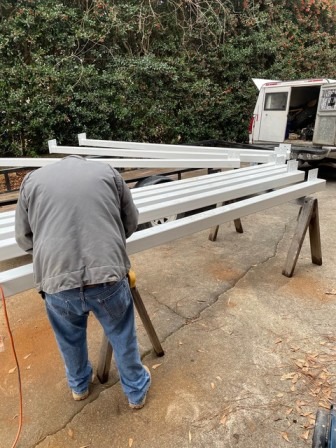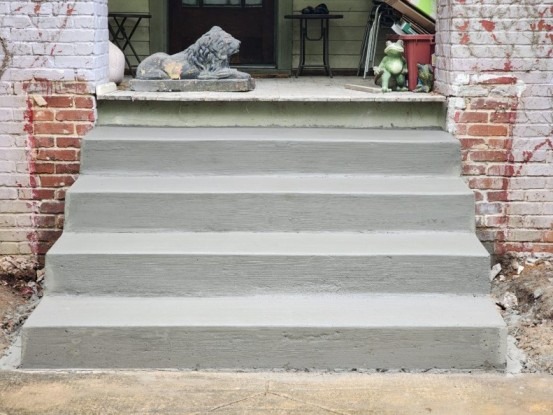Exploring Innovative Waterproofing Techniques for Birmingham

Discover cutting-edge waterproofing techniques in Birmingham. Learn how innovative methods can protect your property and enhance its durability.
Waterproofing is a crucial aspect of home maintenance, particularly in areas prone to heavy rainfall and high humidity. Birmingham, AL, known for its unpredictable weather patterns and occasional flooding, demands effective waterproofing solutions to protect homes and businesses from water damage. In this article, we’ll explore innovative waterproofing techniques tailored for Birmingham’s unique climate, ensuring your property remains dry and secure.
Understanding Birmingham’s Waterproofing Needs
Birmingham’s climate is characterized by high humidity and frequent rainfall, making waterproofing essential for maintaining the structural integrity of buildings. The city experiences significant weather variations, including heavy storms that can lead to flooding and water damage. Understanding these local conditions is the first step in selecting the most effective waterproofing techniques for your property.
Key Factors Influencing Waterproofing in Birmingham
- Heavy Rainfall: Birmingham receives an average of 54 inches of rain per year. This high volume of precipitation necessitates robust waterproofing solutions to prevent water ingress and flooding.
- Humidity: High humidity levels contribute to moisture buildup, which can lead to mold and mildew growth. Effective waterproofing must address both water ingress and humidity control.
- Soil Conditions: The local soil composition can impact drainage and water flow around your property. Understanding soil types and drainage patterns helps in selecting appropriate waterproofing methods.
Traditional Waterproofing Methods
Before diving into innovative techniques, it’s important to review traditional waterproofing methods that have stood the test of time. These methods form the foundation upon which new technologies build.
a. Exterior Waterproofing
Exterior waterproofing involves applying protective coatings or membranes to the outside of a foundation or basement walls. This method is effective in preventing water from penetrating the building envelope. Common materials used include:
- Waterproofing Paint: Applied directly to foundation walls, these paints create a barrier against moisture. They are often used in combination with other methods for enhanced protection.
- Liquid Membranes: These are applied as a liquid and then cured to form a flexible, waterproof layer. They are ideal for irregular surfaces and joints.
- Sheet Membranes: Made from materials like rubber or plastic, these membranes are applied in sheets and sealed at the seams to create a continuous waterproof barrier.
b. Interior Waterproofing
Interior waterproofing methods are used when exterior access is not possible or when additional protection is needed. Techniques include:
- Interior Sealants: Applied to basement walls and floors to prevent water seepage. While effective for minor issues, they may not be sufficient for severe water problems.
- French Drains: Installed along the perimeter of a basement or crawl space, French drains redirect water away from the foundation. They work in conjunction with sump pumps for optimal performance.
- Sump Pumps: These devices collect and pump out water that accumulates in a sump pit. They are essential for homes with below-ground levels or areas prone to flooding.
Innovative Waterproofing Techniques In AL
Recent advancements in waterproofing technology offer more efficient and long-lasting solutions tailored to Birmingham’s specific needs. Here are some cutting-edge methods to consider:
a. Cementitious Waterproofing
Cementitious waterproofing involves using a mixture of cement and waterproofing additives to create a protective layer on concrete surfaces. This method is highly durable and resistant to water pressure. Benefits include:
- High Strength: Provides a robust barrier against water ingress.
- Ease of Application: Can be applied with a brush, roller, or spray.
- Versatility: Suitable for various surfaces, including concrete and masonry.
b. Bentonite Clay Systems
Bentonite clay is a natural material that expands when it comes into contact with water, forming a waterproof barrier. Bentonite clay systems are used in:
- Waterproofing Barriers: Applied as a slurry or in pre-formed panels, bentonite clay creates a self-healing barrier that swells to fill any cracks or gaps.
- Foundation Walls: Provides effective protection against hydrostatic pressure and is ideal for new construction projects.
c. Polyurethane Injection
Polyurethane injection involves injecting a polyurethane-based resin into cracks and voids in foundation walls. The resin expands upon contact with water, filling the cracks and forming a waterproof seal. Advantages include:
- Flexibility: Adapts to movements and shifts in the foundation.
- Quick Curing: Sets rapidly, minimizing disruption.
- Effective Seal: Provides a strong, long-lasting seal against water.
d. Green Waterproofing Solutions
Eco-friendly or “green” waterproofing solutions focus on sustainability and environmental impact. Some options include:
- Green Roofs: Vegetated roofs that absorb and manage rainwater, reducing runoff and improving insulation.
- Rain Gardens: Landscaping features designed to capture and filter rainwater, preventing it from reaching the foundation.
- Permeable Pavements: Surfaces that allow water to pass through, reducing runoff and aiding in groundwater recharge.
Choosing the Right Waterproofing Solution for Your Property
Selecting the most appropriate waterproofing technique depends on various factors, including the type of property, the extent of the water problem, and budget considerations. Here’s how to make an informed decision:
a. Assessment of Needs
Conduct a thorough inspection of your property to identify specific waterproofing needs. Consider factors such as:
- Type of Foundation: Different foundations (e.g., concrete, masonry) may require different waterproofing approaches.
- Water Sources: Determine the primary sources of water intrusion (e.g., rainwater, groundwater).
- Existing Issues: Identify any current problems, such as leaks, mold, or dampness.
b. Consultation with Professionals
Engage with a waterproofing expert to assess your property and recommend suitable solutions. A professional will consider:
- Local Climate: Tailoring solutions to Birmingham’s weather conditions.
- Soil and Drainage: Assessing soil composition and drainage patterns.
- Building Code Requirements: Ensuring compliance with local regulations and standards.
c. Budget Considerations
Evaluate the cost of various waterproofing techniques and choose one that fits your budget while addressing your needs. Consider:
- Initial Costs: Upfront expenses for materials and installation.
- Long-Term Benefits: Potential savings from preventing water damage and reducing maintenance costs.
- Return on Investment: Enhanced property value and longevity.
Maintenance and Long-Term Care
Proper maintenance is essential to ensure the longevity and effectiveness of waterproofing solutions. Regular inspections and maintenance tasks include:
Routine Inspections
- Check for Cracks: Inspect foundation walls and floors for new or widening cracks.
- Monitor Drainage Systems: Ensure that French drains, sump pumps, and other systems are functioning properly.
b. Cleaning and Upkeep
- Clear Gutters and Downspouts: Prevent blockages that can lead to water overflow.
- Maintain Landscaping: Ensure that rain gardens and green roofs are properly maintained and functioning.
c. Addressing Issues Promptly
- Repair Leaks: Address any leaks or water issues as soon as they are detected.
- Reapply Coatings: Renew waterproof coatings or membranes as needed to maintain effectiveness.
Innovative waterproofing techniques offer advanced solutions for protecting properties in Birmingham, AL, from water damage. By understanding local needs, exploring traditional and cutting-edge methods, and choosing the right solution, homeowners can safeguard their properties against the challenges posed by Birmingham’s climate. For expert advice and professional waterproofing services, visit Foundation Pro Services. With the right approach, you can ensure a dry, secure, and resilient home for years to come.
Frequently Asked Questions (FAQs)
When it comes to waterproofing Birmingham homes, many homeowners have questions. Here are some common ones:
1. What is basement waterproofing?
Basement waterproofing involves various techniques to prevent water from entering your basement. This includes interior and exterior solutions, such as sealing cracks and installing drainage systems. Foundation Pros is experienced in diagnosing and repairing foundation problems that are affecting the stability and safety of your home.
2. Why is waterproofing important?
Proper waterproofing helps protect your home from water damage, mold growth, and structural issues. It can also enhance the overall value and comfort of your property.
3. How do I know if my home needs waterproofing?
Signs include damp walls, musty odors, and visible mold. If you notice these issues, it’s best to consult with a professional.
For more information, visit Foundation Pro Services.
Contact Foundation Pro Services Today!
Foundation Pro Services will do everything we can to ensure your experience with us is excellent


